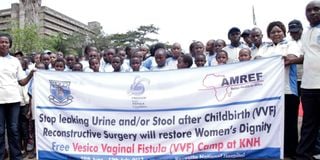Breaking: Autopsy reveals how Cyrus Jirongo died
Spare a thought for woman, girl suffering from this childbirth injury

Participants at the June 28, 2013 launch of an initiative by KNH, Amref and Freedom from Fistula Foundation to fight fistulas among women, which was flagged off by First Lady Margaret Kenyatta.
What you need to know:
- Most women suffering from Obsteric fistula are left desperate, miserable, devastated and, in most cases isolated.
- They feel humiliated and ashamed of their situation as they are abandoned and shunned by those close to them.
One thing that the Covid-19 pandemic has done is expose some hard truths that we have to accept. For instance, the virus has brought to the fore the real nature of humanity; how cruel, brutal, selfish, inhumane, abusive and malicious some people can get in the face of adversity. It is then that sexual and gender-based violence (SGBV), specifically violence against women and girls (VAWG), emerged as the ‘Shadow Pandemic’.
Although this manifestation has not been exclusive to Kenya, it’s important that we consider our situation and work to defeat the monster. The positive aspect of it is that interest groups — including women’s rights organisations, government, communities and individuals — have come out to mitigate the unfortunate unprecedented violations of the rights of girls, women and even boys.
The coronavirus struck in March last year and the resulting containment measures the government imposed in a bid to curb its spread saw gender-based violence (GBV) skyrocket.
Peculiarly, Covid-19 has aided us to see the need to think and work harder to combat longstanding barricades, obstacles and hurdles to gender equality and equity.
One of the conspicuous results of this malevolence has been the huge number of minors impregnated. As a result, the victims have dropped out of school, been forced by their families to marry their abusers — mostly older men — or, thankfully, gone back to school.
Actions by all the interest groups to stem the upsurge of the violence, whose target has been this vulnerable category, has shown progress, albeit painfully slow.
As we focus — and rightly so — on fighting all forms of GBV, a distressing, painful and agonising condition that afflicts women and girls, pushing some to a suicidal state as their community literary segregates them, persists to reign terror, horror and trepidation against its victims. Sadly, obstetric fistula appears to have been generally forgotten, leaving its susceptible and usually desperate sufferer to fight it alone. When it strikes, the woman or girl is usually too overcome by fear, misery and shame to seek medical attention — unless they have around them a supportive family or community.
Crushing childbirth injury
Obsteric fistula is a crushing childbirth injury suffered by girls and women. The result of a protracted, prolonged and obstructed labour, a major cause of maternal mortality, it is a hole in the birth canal that leaves the victim’s urine and stool leaking uncontrollably, medically known as constant incontinence.
As a result, most women suffering from it are left desperate, miserable, devastated and, in most cases isolated. They feel humiliated and ashamed of their situation as they are abandoned and shunned by those close to them, including their spouses, owing to the unhygienic nature of the condition. They will also hardly venture outside to interact with others or earn an income due to feelings of humiliation.
There are no precise statistics but the number of women and girls affected by the condition in Kenya is estimated at 3,000 annually with 300,000 untreated. The World Health Organization estimates that more than two million young women in Asia and Sub-Saharan Africa live with the condition.
However, it’s not all doom and gloom; obstetric fistula is treatable and preventable. That’s why we must act now to rescue girls and women who fall victim to it. One way of preventing it is by improving maternal health, obstetric care and timely provision of reproductive health services in general.
It’s also critical to intensify the fight against harmful practices such as female genital cutting and child marriages, which unscrupulous people continue to practise under the cover of Covid-19 as they violate the rights, and entitlement of, girls to a bright future.
And what a better day to renew commitments, and act, to eradicate obstetric fistula from mostly the developing world than this week!
Sunday is the International Day to End Fistula. And the theme is apt: “Women’s Rights are Human Rights. End Fistula Now!”
Ms Rugene, a consulting editor, is founder and executive director, The Woman’s Newsroom Foundation. [email protected]. @nrugene





